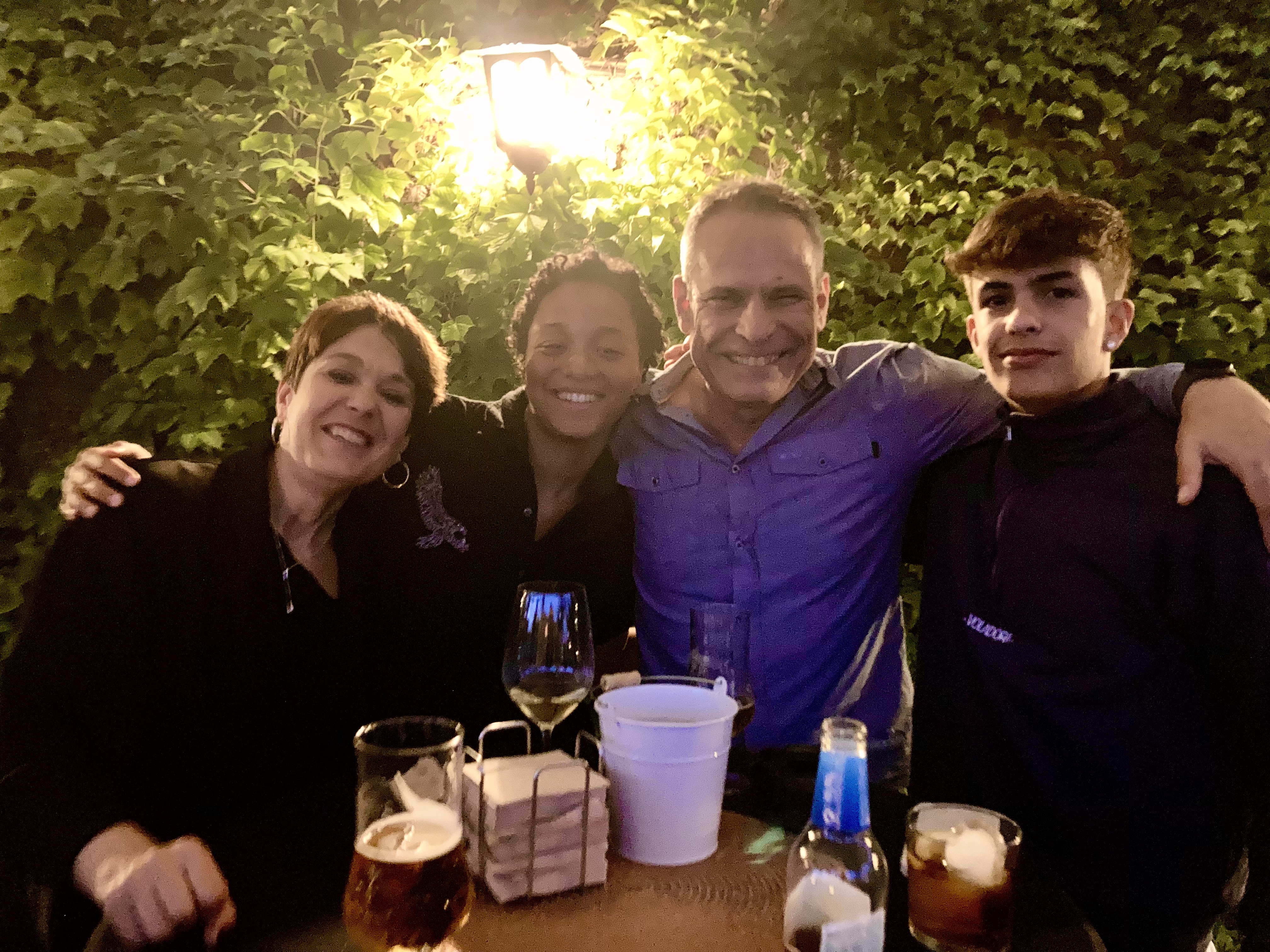Housing
CASA Granada offers two housing options:
• homestay accommodations
• university residence hall
Housing is guaranteed for all CASA Granada students through the duration of their program.
Students who meet specific criteria explained below may opt out of the program housing and secure independent living arrangements in local apartments.
Homestay Accommodations

Carefully vetted and selected by CLM and CASA staff, all homestay accommodations are located in safe neighborhoods at varying distances from the city center and from the University facilities. CASA students (one or two to a home) will have a single room and a shared bathroom.
What is included?
All meals are included in the housing fee (full board seven days a week throughout the semester). Bed linens and towels are also provided and your laundry is washed weekly. You will be given keys to the home (generally a condominium) and can come and go as you please. There is no curfew, only an expectation of common courtesy and open communication. Internet access is also provided in every homestay accommodation.
What are the benefits?
There are numerous benefits to living with a host family, the most important of which is the constant exposure to Spanish language, cultural norms and cuisine. You can expect to have at least 1-2 meals/day together with the family (according to work and class schedules); and daily conversations around the table can be a wonderful way to expand both vocabulary and an understanding of current events in Spain.
What can I expect?
It is important to make note that, as in the U.S. and elsewhere, the composition of a Spanish family will vary from home to home. It is also possible that CASA students will share your home with another international student. The University of Granada is the most highly requested destination among ERASMUS students (European study abroad students) and is also a popular destination for Asian, North African and Latin American students. This brings a young, engaged international community not only to the city of Granada but to the homes of its residents as well.
Testimonials from students who lived in a Homestay
My homestay was the highlight of my experience in Spain. I lived in the center of the city in a great apartment with a private bedroom and bathroom, and my room had an incredible view of the Sierra Nevadas. The family I lived with really became my second family, and I still text with them often. I also feel so welcome to go back and visit them any time!
I ate most days with the family because the food was great and so convenient. It was a great way to practice Spanish, learn more about the culture, and build routine. However, there's no pressure to spend a bunch of time at home or eat every meal with them; it's just always available to you if you want it. I really liked that because I maintained the flexibility that comes with living independently in dorms while also always feeling like I had a home (with good food, laundry, etc) that I could come back to.
In my opinion, it's more enriching to live with family because they want to connect with you and you can cultivate relationships that will last forever. Homestay just adds to the study abroad experience, and it's a once in a lifetime experience that is 100% worth it.
- Brown University, Fall 2024
Living with a host family was the best decision I made. My host mom and host sister welcomed me with open arms and we connected immediately. They truly felt like family. My host sister and I were only a year apart in age and we did everything together. My experience was really shaped around them. Not to mention I was so close to the center of the city and enjoyed home cooked meals everyday. My host family and I all cried when we had to leave each other. We still text all the time though and I will always consider them my family. I couldn’t recommend having a host family enough.
- Brown University, Spring 2025
After spending 5 months living with a host family, I can say that choosing a homestay over the residence hall was completely worth it for me. If you want to improve your Spanish as much as possible and feel integrated into the Spanish culture, a host family is an excellent choice. My host family gave me a sense of cultural nuance that I would not have had without them--teaching me popular slang, informing me about various events and festivals (of which there are many, because the Spanish love to celebrate), and discussing both current and historical politics and society in Spain. Speaking Spanish everyday with my family served as an intensive, so I took the language and culture classes, which gave me more flexibility to travel as I had Fridays off. One caveat to a family is that can be a bit harder to integrate with other CASA students. You need to be an independent person who’s comfortable putting themselves out there by taking the initiative to reach out to people. In the end, I was able to make some incredible friends through the CASA program, and I’m so thankful that I had the support of my host family for my time in Spain.
- Barnard University, Spring 2025
Residence Hall Accommodations
If you choose residence hall accommodations, you will have a single room with a private bathroom and a kitchen shared with one or more students. Like the Schools of the University, the residence halls are located at different points around the city, and house students from all over Spain and around the world. Dorm rooms are fully furnished and include linens, basic cooking utensils, internet, heat/AC and a weekly cleaning service. Dining halls, common areas, study halls and laundry rooms are located either within or next door to the residence hall facilities.
Testimonials from students who lived in the residence hall
Living in the Carlos V residence hall truly helped make my time in Granada the incredible experience that it was. When we first arrived, I was concerned about the possibility of it feeling isolated from the city given the 25 minute walk to get to el centro but while I quickly discovered this not to be the case, the separation ended up being something I loved and appreciated. La residencia itself is wonderful with lots of community spaces, spacious rooms and kitchens and a very communal feel. It allowed me to regularly interact with my friends from CASA as well as meet and integrate with some of the Spanish students living there as well. The walk down from la residencia, although feeling a bit long at first, ended up being one of my favorite parts the day. In the morning, it was always calm and quiet and then you would slowly make your way into the bustling city center where you could find amazing breakfast places and coffee shops, and coming back in the evening would always stun us with the most beautiful sunset views I have ever seen in my life.
- Brown University, Spring 2025
During my time in Granada, I was very fortunate to live in the residence hall with a Spanish roommate! I find this to be one of the best decisions I made when I reflect on my semester in Granada. Before coming to Granada, I was quite torn between living in a residence hall or in a homestay. I struggled to decide whether I would prefer the independence and connection with fellow abroad students that living in the residence hall would provide or the true language and cultural immersion that would come from living in a homestay. I feel like I struck the perfect balance by sharing a kitchen/being roommates with a Spanish university student! Javi, my roommate, quickly turned into one of my best friends — we often joked that I was his American brother and he was my Spanish brother. He also introduced me to his multitude of Spanish friends who I was lucky to grow close to! Overall, I was able to enjoy all of the perks that I hoped to find from living in the Resa while also getting a true immersion in Spanish culture and language with my Spanish roommate. It also helped that we were both taking courses at the same faculty together (which made the transition to the very differently structured Spanish schooling system much easier!). When we had to say goodbye, it truly felt like I was leaving a second life behind because of how close I had grown to all of the university students — all of which would not have been possible without having Javi as my roommate in Resa!
- Harvard, Spring 2025
Independent Housing - Petition Approval Required
CASA Granada permits independent living arrangements strictly for:
1) full-year students during their second semester in Granada,
2) students who have previously had a semester-long study abroad experience in a Spanish-speaking country,
3) non-traditional age students with significant life experience.
Only students in these specific circumstances may choose to secure their own housing in local apartments with other university students (contingent on prior approval from their home schools).
Qualified CASA Granada students who choose independent housing are responsible for locating an apartment, signing a lease, finding/screening roommates, paying rent and all utilities, and living truly independently (grocery shopping, cooking, cleaning, etc.). It is recommended that only eligible students who have lived on their own previously consider this option. Independent students should aim to live with Spanish and international students from non-English speaking countries to ensure an environment conducive to practicing and advancing their Spanish language skills.











